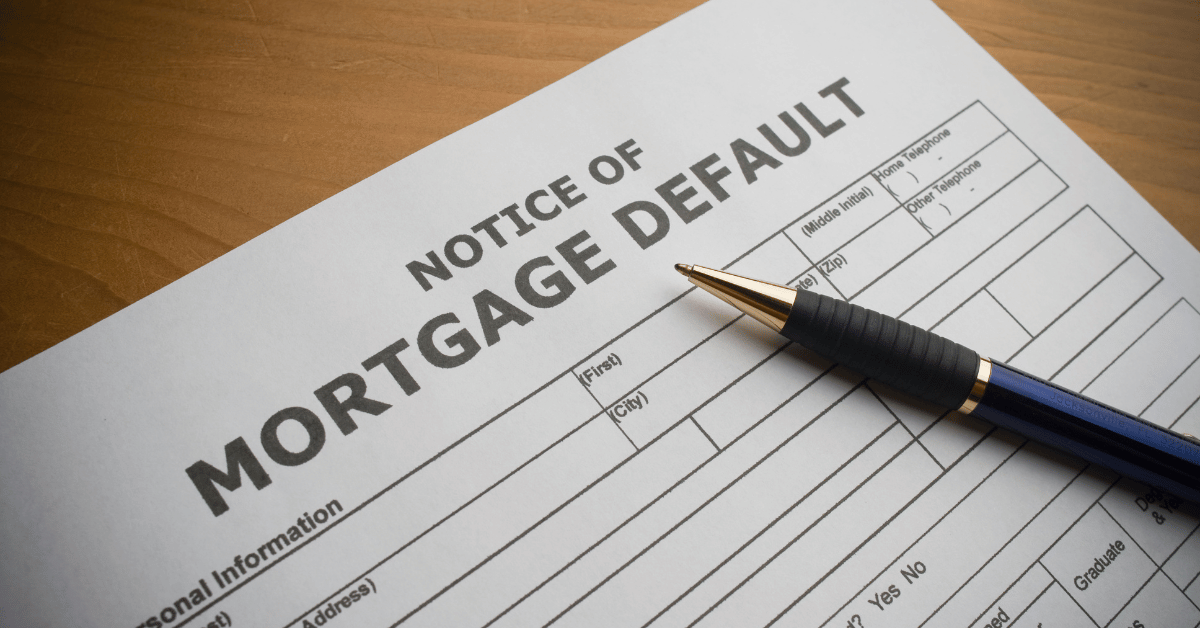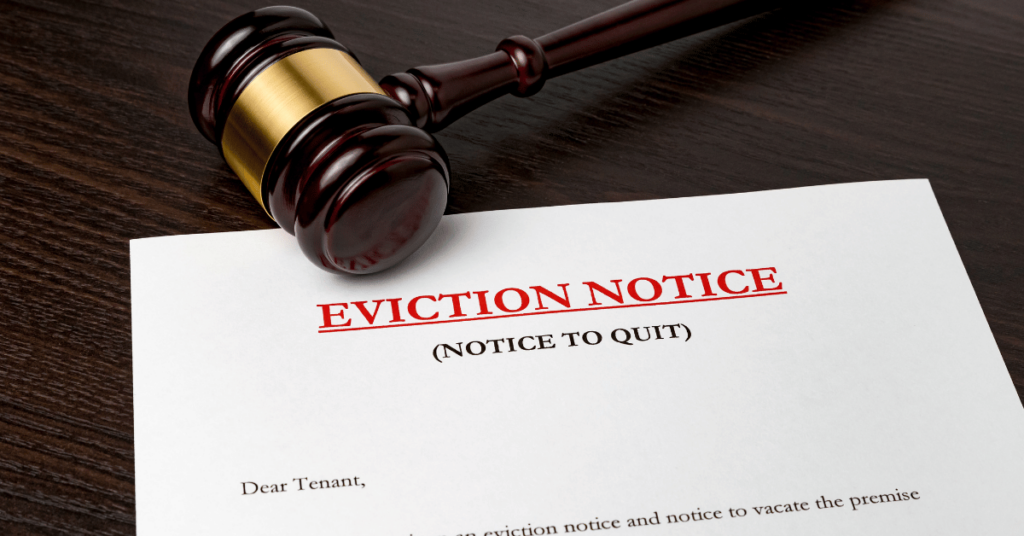As of 2023, 1.4% of all US mortgages were classified as defaulted, meaning they were 90 days or more late. This can have serious consequences, such as foreclosure, negative effects on your credit score, or even bankruptcy.

First, let’s answer this: what does it mean if you default on a mortgage?
Simply put, defaulting on a mortgage means failing to make your monthly payments on time. This can happen for any number of reasons, such as job loss, medical expenses, or divorce.
In this guide, we’ll talk about what happens if you default on a mortgage and how to get out of it.
What Does It Mean to Default on a Mortgage?
A mortgage loan default occurs when you fail to complete your monthly payments on time. This can happen for various reasons, but 70% of mortgage defaults are due to negative life events. The most common causes include:
- Job loss: Losing your job or a significant cut in income can make it harder to afford your mortgage payments.
- Medical expenses: Unexpected medical bills can quickly drain your finances and make it challenging to meet your mortgage obligations.
- Divorce: Divorce can be a financially stressful event. The costs of dividing assets and property can make it more difficult to pay a mortgage.
- Rising interest rates: When interest rates rise, your monthly mortgage payments also increase, making it harder to afford.
- Unexpected expenses: Unexpected costs, such as vehicle repairs or home improvements, can make it tricky to complete your mortgage payments.
Signs of Potential Default
If you’re struggling to make your mortgage payments, it’s best to take action before you default. Here are some signs that you may be at risk of default:
- You’ve missed one or more mortgage payments.
- Your debt-to-income ratio is increasing.
- You’re having trouble making ends meet nearly every month.
- You’re late on other bills like credit card payments or car loans.
What Happens If You Default on a Mortgage?
Foreclosure is the most common consequence of a mortgage loan default, but it’s not always the case. Here are three mortgage default consequences you can expect in most scenarios.
Foreclosure
In Q1 2024, approximately one in every 1,478 housing units had a foreclosure filing due to a defaulted mortgage. If you default on mortgage payments, your lender may initiate foreclosure.
Here are the steps involved in the foreclosure process:
- Pre-foreclosure Notice: Your lender will typically send you a notice informing you that you’re in default and that they may opt for foreclosure. According to federal law, lenders must wait at least 120 days after the first missed payment before foreclosure.
- Foreclosure Sale: If you don’t update your mortgage, your lender can schedule a foreclosure sale. Your home will then be sold to the highest bidder.
- Deficiency Judgment: If the proceeds from the property sale don’t cover the mortgage, your lender may seek a deficiency judgment against you. This means they can try to collect the remaining balance from your other assets.
- Eviction: After the foreclosure sale, you will be evicted from your home. You will lose ownership of the property and may be required to move out.
The laws surrounding foreclosure can vary by state. For instance, California requires a notice of default to be sent 90 days after missed payments before foreclosure can begin.
Meanwhile, New York requires judicial foreclosure, which can take longer due to court involvement. Lastly, Texas allows non-judicial foreclosure. This will enable lenders to foreclose without court approval after 21 days of notice.
Financial Consequences
First and foremost, a mortgage default can have a devastating impact on your credit score. In fact, a foreclosure remains on a borrower’s credit report for up to seven years. This can make it harder to get future loans, such as mortgages, car loans, and credit cards.
If you cannot manage your debt after a mortgage default, you may be forced to file for bankruptcy. Chapter 13 bankruptcies may remain on your credit report for at least seven years, while Chapter 7 bankruptcies stay for ten years.
Defaulting on a mortgage can also force you to sell your assets, including your savings and investments. This can have a major impact on your financial security.
Legal Consequences
Defaulting on a mortgage can also have serious legal consequences.
For instance, if your lender wins the foreclosure case, they can get a foreclosure judgment against you. This judgment can be used to seize your assets and garnish your wages. That means a portion of your paycheck will be withheld every month to pay off the debt.
Your lender can also place a lien on your property, making it harder to sell or even refinance. In other cases, the lender may sue you for the mortgage debt.
How to Get Out of Mortgage Default
If you’re facing mortgage default, there are still several ways to help you avoid foreclosure.
- Loan Modification: A loan modification means changing your mortgage loan terms. That could include lowering your interest rate, extending your repayment period, or reducing your monthly payment.
- Forbearance: That is a short, temporary pause or reduction in your monthly mortgage payments. It can be helpful if you’re facing a temporary financial hardship.
- Short Sale: A short sale occurs when you sell the house for less than the outstanding mortgage balance. You can opt for one if you can’t afford to keep your home or the sale price is less than the amount you owe.
- Deed in Lieu: A deed in lieu of foreclosure allows you to hand over ownership of your property to your lender.
- Bankruptcy: Filing for bankruptcy can temporarily pause foreclosure and give you a fresh start. However, bankruptcy can negatively impact your credit score and financial future.
- Selling a mortgage note: If you hold a mortgage note, you can sell your note to avoid the headache of foreclosures.
Conclusion
As mortgage rates are on the rise, so are mortgage default rates. It’s not too unexpected to struggle with paying your monthly dues.
However, defaulting on a mortgage can have severe financial and legal consequences. Still, don’t lose hope – you can avoid foreclosure by understanding your options and seeking professional help.
Frequently Asked Questions About Mortgage Default
What are your legal rights during a mortgage default?
As a homeowner, you still have important rights even if you’ve missed payments or go into default. The mortgage agreement and state laws determine the lender’s next steps. Before foreclosure proceedings begin, lenders are required to send a default notice and give you time to reinstate your mortgage or explore options like loan modification, forbearance, or selling the property. In some states, you can even stay in your home during most of the foreclosure process. Be sure to contact your mortgage servicer and review the terms of your mortgage.
How long after missing a payment are you in default?
Technically, you’re considered late as soon as you miss a mortgage payment, but most lenders allow a short grace period. You’re usually not classified as “in default” until you’re at least 30 days behind. A mortgage default notice might be issued after that, and foreclosure can begin once you’re 120 days late. The exact timeline will depend on your loan agreement and state-specific rules.
Is it bad to default on a mortgage?
Yes. Defaulting on your mortgage affects your credit, finances, and ability to get a new mortgage in the future. A default notice can damage your score, and a foreclosure on your credit report stays there for up to seven years. You also risk losing any home equity you’ve built. If you fall behind long enough, the lender can accelerate the debt, requiring you to pay off your mortgage in full or face foreclosure.
Can a default be reversed?
Yes. If you’re already in default, you can still get back on track by pursuing mortgage reinstatement, refinancing, or negotiating new mortgage terms. Some borrowers qualify for a loan modification that makes it easier to manage payments. You can also sell your home for less than the balance owed through a short sale, or explore a deed in lieu of foreclosure to avoid losing your home altogether.
Can I skip 2 mortgage payments?
Skipping two payments without a formal agreement like mortgage forbearance puts your home loan at serious risk. Your mortgage lender can report the delinquency, issue a default notice, and begin foreclosure proceedings. If you’re experiencing financial hardship, speak with your servicer or a housing counselor immediately—waiting will only reduce your options.
How does refinancing your mortgage help avoid default?
Refinancing your mortgage can reduce your monthly payment or adjust the loan terms to better suit your financial situation. For homeowners with an existing mortgage who are struggling to keep up, securing a new loan with a lower interest rate or longer repayment term can help avoid mortgage default before things escalate.
What is the difference between a mortgage contract and a loan contract?
A mortgage contract specifically secures the loan amount with real property, while a loan contract outlines the general repayment terms without necessarily attaching a security interest. Understanding both documents is important if you’re at risk of default and want to know how the lender can accelerate the debt or begin the foreclosure process.
Can mortgage default affect your ability to get another mortgage?
Yes. Once mortgage default occurs, it significantly affects your mortgage eligibility in the future. If you’re going through a foreclosure, it may take several years before you’re able to get a mortgage from most lenders again—especially if you’re applying for a conventional loan.
When should you contact your mortgage lender?
If you’ve missed a mortgage payment or expect to fall behind, you should contact your mortgage lender immediately. They may offer solutions like mortgage modification, loan forbearance, or other options to help you stay in your home and avoid default.
What happens to the loan balance if you refinance?
When refinancing your mortgage, your original loan is paid off using funds from the new loan. Your loan balance may increase slightly if you roll closing costs into the refinance, but the goal is often to secure a lower monthly payment that better matches your financial situation.






Leave a Reply